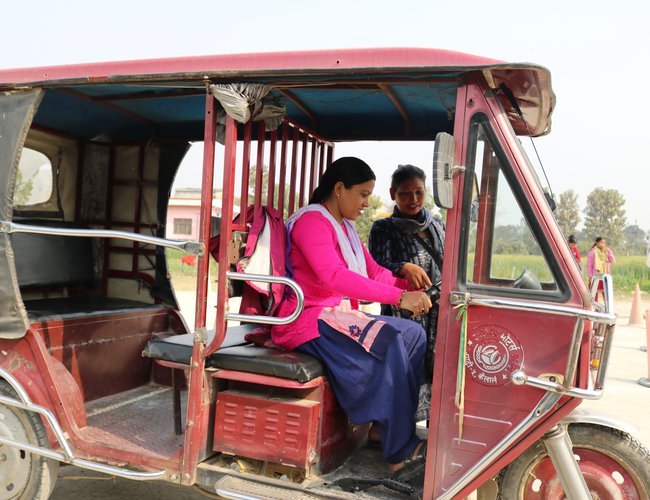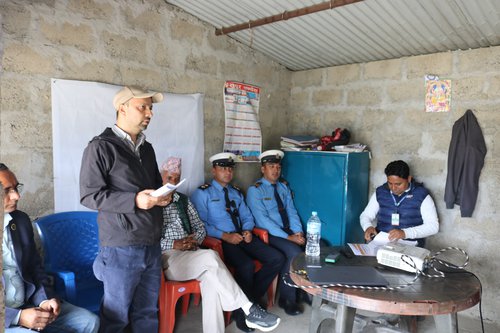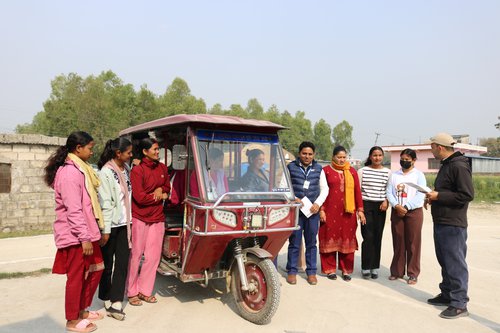
An experienced e-rikshaw driver (one of the trainers), guiding participants during the training session.
Women are playing a key role in driving the transition to clean energy in Nepal. Electric rickshaws (e-rickshaws) are becoming increasingly popular in urban and semi-urban areas of the Terai region, where public transportation is vital. These battery-operated vehicles offer an eco-friendly and affordable transportation option for both passengers and drivers. Many women in Dhangadhi have taken up e-rickshaw driving due to its ease of operation, decent income, and flexible working hours. This has allowed them to gain financial independence and break into a male-dominated industry.
Acknowledging the potential of clean energy technologies and the significant upfront costs involved, Srijanshil Cooperative has been striving to enhance the accessibility and affordability of renewable energy technologies, such as e-rickshaws. The cooperative has implemented loan schemes and, most recently, initiated an e-rickshaw driving training program with the backing of the Renewable Energy and Energy Efficiency Programme-Green Recovery and Empowerment with Energy in Nepal (REEEP-GREEN) through the sustainable energy challenge fund. The primary goal of this endeavor is to encourage the adoption of decentralized renewable energy technologies and to generate fresh economic prospects for women.

Theoretical session on traffic rules conducted by local traffic police
In late February, the cooperative organized a four-day training session in Dhangadhi, where 19 women and 1 man received driving lessons to enhance their road navigation skills. The training included both theoretical and practical sessions, allowing participants to gain hands-on experience behind the wheel. To ensure effective learning, the cooperative enlisted two trainers, one of whom was a seasoned female e-rickshaw driver who served as an instructor and role model for the trainees. Local traffic officers also shared valuable insights on road safety laws and regulations to emphasize the importance of responsible driving.
The training proved to be a transformative experience for many women. One participant remarked, "Learning to drive was a new skill for us. Some of us didn't even know how to ride a bicycle, and now we can confidently operate the rickshaw on the road." While most women felt empowered by their newfound skills after the four-day program, some expressed a desire for additional practice sessions to further boost their confidence.

“gained a new skill and built our confidence. Now, we feel that we can achieve anything we set our minds to!”
As per the cooperative, since formal e-rickshaw driving courses were unavailable in driving institutions, the cooperative took the initiative to offer practical training along with loan support
Acknowledging this, the cooperative intends to extend the duration of future training sessions and introduce a maintenance session to assist drivers in troubleshooting minor technical issues. The women from the initial group who need additional practice will also be included in the upcoming classes. According to the cooperative, "Our main objective (of the event) is to support women in obtaining their driving licenses and empower them to pursue e-rickshaw driving as a sustainable profession."
Following the training sessions, the cooperative will provide loans to a total of 120 individuals to help them purchase their own e-rickshaws. Participants are eager to acquire their driver's licenses, with many planning to buy an e-rickshaw within six months. Some women who were previously only involved in household duties expressed their enthusiasm for the opportunity and stated, "Driving an e-rickshaw will give us an independent source of income and reduce our reliance on our husbands."
Reports indicate that driving electric rickshaws is a viable and sustainable source of income for both men and women in Dhangadi. The cooperative expressed confidence that women will be able to easily repay their vehicle loans and maintain a comfortable lifestyle with the income from e-rickshaw driving. The cooperative aims to empower women to take a leading role in the energy transition. The first batch of loan disbursements is planned for the end of March.
As more women enter the e-rickshaw driving sector, they are not only changing their own lives but also challenging societal norms and demonstrating that professional driving is not limited to men. With ongoing support from Shrijanshil Cooperative, this initiative will promote clean energy technologies and empower more women by providing them with the necessary skills, financial support, and confidence to succeed in a growing, sustainable industry. In addition to electric rickshaws, the cooperative is also promoting solar water pumps and biogas through their renewable energy loan products with the assistance of REEEP-GREEN.
The Renewable Energy and Energy Efficiency Programme – Green Recovery and Empowerment with Energy in Nepal (REEEP-GREEN) is a technical cooperation project jointly funded by the Federal Republic of Germany (BMZ) and the European Union (EU). The project's goal is to improve the planning and execution of renewable energy and energy efficiency initiatives in Nepal. GIZ, along with partners such as the Ministry of Energy, Water Resources, and Irrigation (MoEWRI) and Alternative Energy Promotion Centre, is responsible for implementing the project. This initiative is a component of the Team Europe Initiative (TEI) focused on "Green Recovery."
- Korean Embassy Hosts FRIENDS OF KOREA 2025 Event in Kathmandu
- Apr 19, 2025
- Weather Forecast: Partly To Generally Cloudy With Rain And Thunder Acrosss Nepal
- Apr 19, 2025
- Minister Dahal Directed To Complete The Dannune Portion Of Road Before Monsoon
- Apr 18, 2025
- Kanchenjunga Diamond Festival Being Celebrated From Today To Mark The 70th Anniversary Of The First Successful Ascent
- Apr 18, 2025
- RPP To Hold Protest In Restricted Areas Of Kathmandu On April 20
- Apr 18, 2025















